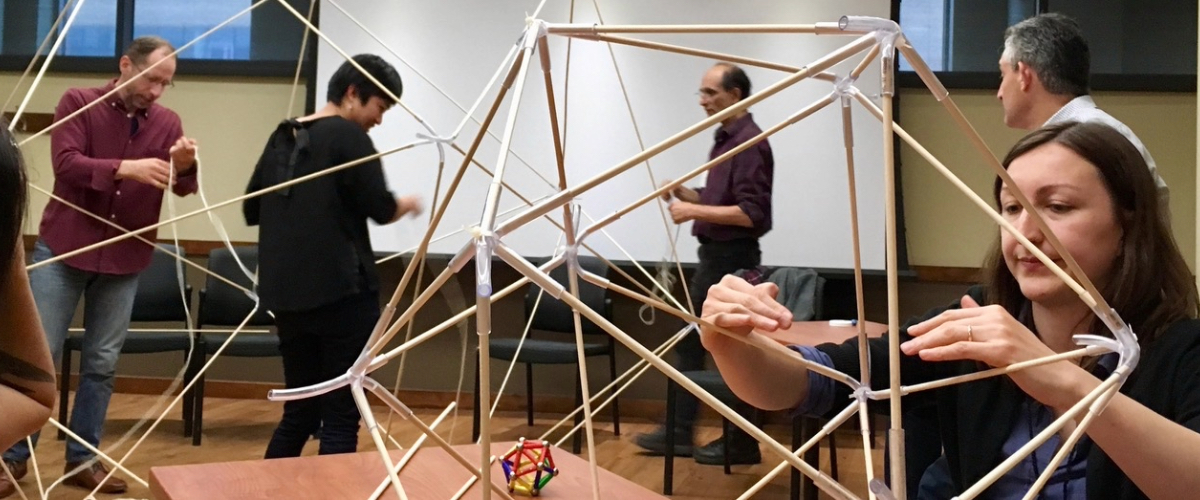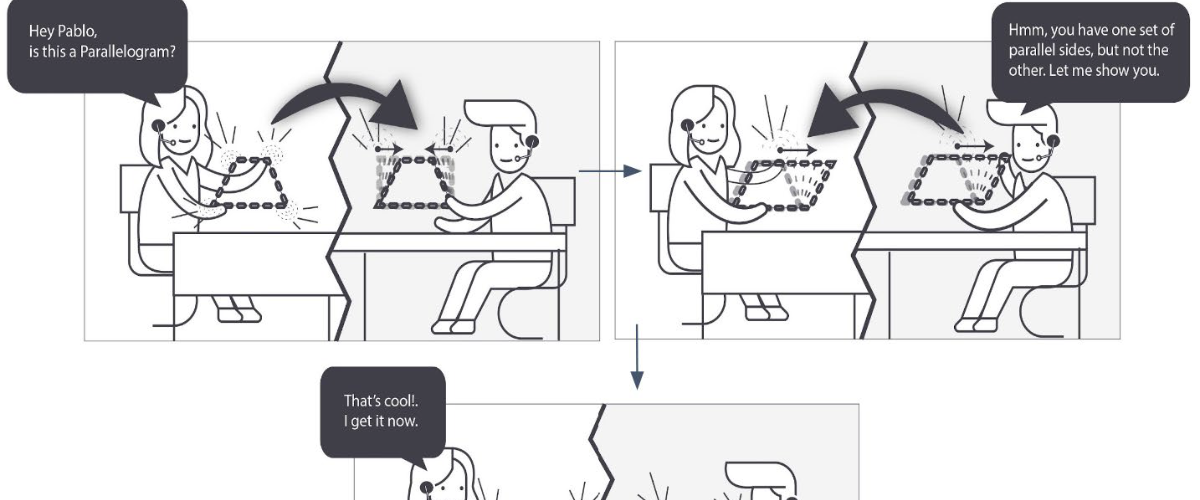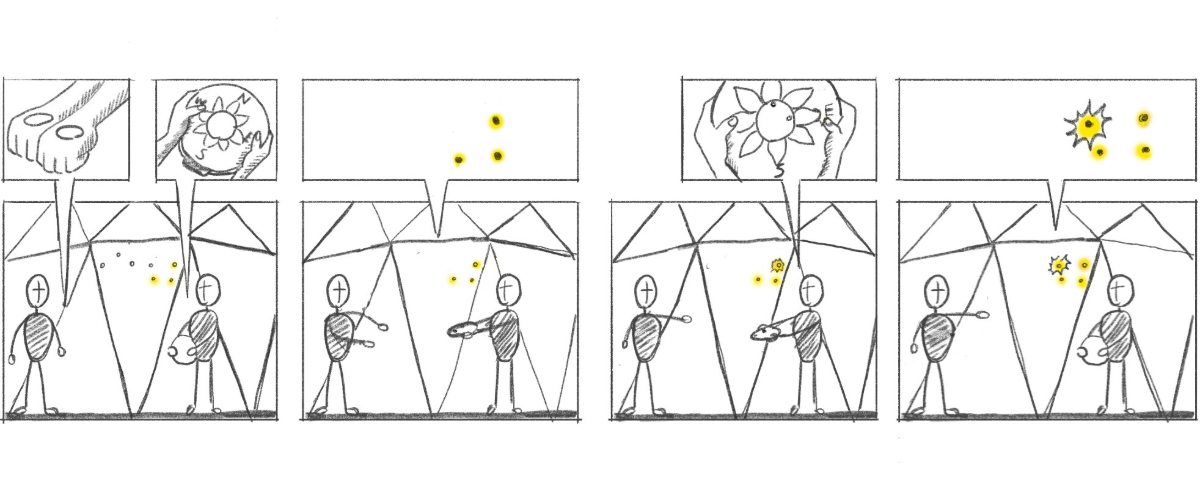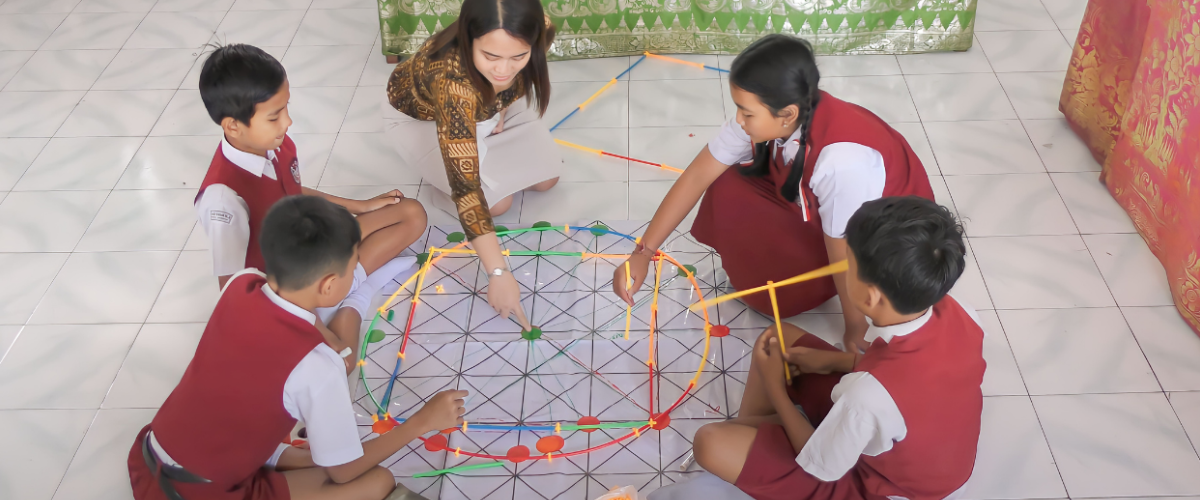Please take a look at our lab’s most recent publications and feel free to contact us if they align with your efforts, or if there is potential for collaboration. For our full list, visit the publications page.
In press
- Palatnik, A., & Abrahamson, D. (in press). Building knowledge: Studying geometry through collaborative construction of body-scale structures.Journal of the Learning Sciences. https://doi.org/10.1080/10508406.2026.2622059(Read More)
- Abrahamson, D., Lomos, C., & Palatnik, A. (in press). The icosahedron in the room: Revisiting pedagogical dilemmas of individual learning in collaborative activities.Contribution for O. Swidan (Leader), TWG 16: Learning Mathematics With Technology and Other Resources. In M. Bosch & S. Carreira (Eds.), Proceedings of the 14th annual Congress of the European Society for Research in Mathematics Education (CERME14). ERME.(Read More)
2022
- Hutto, D. D., & Abrahamson, D. (2022). Embodied, enactive education: Conservative versus radical approaches.In S. Macrine & J. Fugate (Eds.), Movement matters: How embodied cognition informs teaching and learning (pp. 39–52). MIT Press.(Read More)
- Palatnik, A., & Abrahamson, D. (2022). Escape from Plato’s cave: An enactivist argument for learning 3D geometry by constructing tangible models.In G. Bolondi, F. Ferretti, & C. Spagnolo (Eds.), Proceedings of the Twelfth Congress of the European Society for Research in Mathematics Education (CERME12, February 6–10, 2022). ERME.(Read More)
- Tancredi, S., Wang, J. X., Li, H. L., Yao, C. J., Macfarlan, G. L., & Ryokai, K. (2022). Balance Board Math: “Being the graph” through the sense of balance for embodied self-regulation and learning.In M. Horn, M. Giannakos, & T. Pontual (Eds.), Proceedings of IDC ’22: Interaction Design and Children (Vol. “Full papers”, pp. 137–149). https://doi.org/10.1145/3501712.3529743(Read More)
- Lambert, S. G., Tancredi, S., Fiedler, B. L., Moore, E. B., Gorlewicz, J. L., Abrahamson, D., & Gomez Paloma, F. (2022). Getting a grip on geometry: Developing a tangible manipulative for inclusive quadrilateral learning.Italian Journal of Health Education, Sports and Inclusive Didactics, 6(1), 1–21. https://doi.org/10.32043/gsd.v6i1.604(Read More)
- Tancredi, S., Chen, R. S. Y., Krause, C. M., & Siu, Y.–T. (2022). The need for SpEED: Reimagining accessibility through Special Education Embodied Design.In S. L. Macrine & J. M. B. Fugate (Eds.), Movement matters: How embodied cognition informs teaching and learning (pp. 197–216). M.I.T. Press.(Read More)
- Tancredi, S., Wang, J. X., Li, H. L., Yao, C. J., Ryokai, K., & Abrahamson, D. (2022). Graphing with Balance Board Math: Critical embodied design for regulation and learning.In C. Chinn, E. Tan, C. Chan, & Y. Kali (Eds.), “International collaboration toward educational innovation for all: Overarching research, development, and practices”—Proceedings of the 16th annual meeting of the Learning Sciences (ICLS 2022), Hiroshima, Japan (online) (pp. 1181-1184). ISLS.(Read More)
- Chen, R. S. Y. (2022). Improvisations in the embodied interactions of a non-speaking autistic child and his mother: practices for creating intersubjective understandingCognitive Linguistics, 33 https://doi.org/10.1515/cog-2021-0047(Read More)
- Abrahamson, D., & Mechsner, F. (2022). Toward synergizing educational research and movement sciences: A dialogue on learning as developing perception for action.Educational Psychology Review, 34(3), 1813-1842. https://doi.org/10.1007/s10648-022-09668-3(Read More)
- Benally, J., Palatnik, A., Ryokai, K., & Abrahamson, D. (2022). Learning through negotiating conceptually generative perspectival complementarities: The case of geometry.For the Learning of Mathematics. 42(3), 34–41.(Read More)
- Lambert, S. G., Fiedler, B. L., Hershenow, C. S., Abrahamson, D., & Gorlewicz, J. L. (2022). A tangible manipulative for inclusive quadrilateral learning.The Journal on Technology and Persons with Disabilities, 10, 66–81.(Read More)
- Tancredi, S., Abdu, R., Balasubramaniam, R., & Abrahamson, D. (2022). Intermodality in multimodal learning analytics for cognitive theory development: A case from embodied design for mathematics learning.In M. Giannakos, D. Spikol, D. Di Mitri, K. Sharma, X. Ochoa, & R. Hammad (Eds.), The multimodal learning analytics handbook. Springer.(Read More)
- Abrahamson, D., Dutton, E., & Bakker, A. (2022). Towards an enactivist mathematics pedagogy.In S. A. Stolz (Ed.), The body, embodiment, and education: An interdisciplinary approach (pp. 156–182). Routledge.(Read More)
- Flood, V. J., Shvarts, A., & Abrahamson, D. (2022). Responsive teaching for embodied learning with technology.In S. Macrine & J. Fugate (Eds.), Movement matters: How embodied cognition informs teaching and learning (pp. 179–195). MIT Press.(Read More)
- Abrahamson, D., & Lindgren, R. (2022). Embodiment and embodied design.In R. K. Sawyer (Ed.), The Cambridge handbook of the learning sciences (3rd ed.) (pp. 301–320). Cambridge University Press.(Read More)
- Abrahamson, D. (2022). W(h)ither the Learning Sciences? An acerbic rumination.Prepared for M.-C. Shanahan, B. Kim, K. Koh, A. P. Preciado-Babb, & M. A. Takeuchi (Eds.), Learning sciences in conversation: Theories, methodologies, and boundary spaces. Routledge.(Read More)
- Abrahamson, D. (2022). Enactive perception as mathematics learning.In M.-C. Shanahan, B. Kim, M. A. Takeuchi, K. Koh, A. P. Preciado-Babb, & P. Sengupta (Eds.), The Learning Sciences in conversation: Theories, methodologies, and boundary spaces (pp. 153–170). Routledge.(Read More)
2021
- Abrahamson, D. (2021). Enactivist how? Rethinking metaphorizing as imaginary constraints projected on sensorimotor interaction dynamics.Constructivist Foundations, 16(3), 275-278.(Read More)
- Velautham, L., & Chen, R. S. Y. (2021). Can’t clap to a beat? How rhythmically challenged people experience and strategize keeping time to music.Psychology of Music. https://doi.org/10.1177/03057356211049564(Read More)
- Chen, R. S. Y. (2021, June). Embodied design for non-speaking Autistic children: the emergence of rhythmical joint action.n Interaction Design and Children, pp. 648-651. https://doi.org/10.1145/3459990.3463396(Read More)
- Cooper, B., Soto, G., & Clarke, M. (2021). Prompting for repair as a language teaching strategy for augmentative and alternative communication.Augmentative and Alternative Communication. https://doi.org/10.1080/07434618.2021.1979648(Read More)
- Abrahamson, D., Worsley, M., Pardos, Z., & Ou, L. (2021). Learning analytics of embodied design: Enhancing synergy.International Journal of Child-Computer Interaction, 100409. https://doi.org/10.1016/j.ijcci.2021.100409(Read More)
- Tancredi, S., Chen, R. S. Y., Krause, C. M., Abrahamson, D., & Gomez Paloma, F. (2021). Getting up to SpEED: Special education embodied design for sensorially equitable inclusion.Education Sciences and Society, 12(1). https://doi.org/10.3280/ess1-2021oa11818(Read More)
- Pardos, Z. A., Rosenbaum, L. F., & Abrahamson, D. (2021). Characterizing learner behavior from touchscreen data.International Journal of Child-Computer Interaction, 100357. https://doi.org/10.1016/j.ijcci.2021.100357(Read More)
- Ba, H., & Abrahamson, D. (2021). Taking design to task: A dialogue on task-initiation in STEM activitiesEducational Designer, 4(14), 1–21. http://www.educationaldesigner.org/ed/volume4/issue14/article54/(Read More)
- Chen, R.S.Y. (2021). The researcher’s participant roles in ethical data collection of Autistic interactionIn Social Interaction. Video-Based Studies of Human Sociality, 4(2). https://doi.org/10.7146/si.v4i2.127298(Read More)
- Tancredi, S., Abdu, R., Abrahamson, D., & Balasubramaniam, R. (2021). Proof of concept: Applying Recurrence Quantification Analysis to model nonlinear dynamics of mathematics learning in an embodied design.In E. de Vries, J. Ahn, & Y. Hod (Eds.), Reflecting the past and embracing the future—Proceedings of the annual conference of the International Society of the Learning Sciences. Ruhr-Universität Bochum.(Read More)
- Krause, C. M., Di Martino, P., & Moschkovich, J. N. (2021). Tales from three countries: Reflections during COVID-19 for mathematics education in the future.Educational Studies in Mathematics, special issue ‘Mathematics education in a time of crisis – a viral pandemic’. Online first https://doi.org/10.1007/s10649-021-10066-9(Read More)
- Krause, C. M. & Wille, A. M. (2021). Sign language in light of mathematics education: an exploration within semiotic and embodiment theories of learning mathematics.In American Annals of the Deaf, 166(3) (Special issue ‘Critical Topics in Mathematics Education: Research to Practice with Deaf/Hard-of-Hearing Students’), 358–383.(Read More)
- Krause, C. M., & Farsani, D. (2021). Gestures and code-switching in mathematics instruction – an exploratory case study.In Proceedings of the 44th Conference of the International Group for the Psychology in Mathematics Education. PME.(Read More)
- Tancredi, S., Abdu, R., Abrahamson, D., & Balasubramaniam, R. (2021). Modeling nonlinear dynamics of fluency development in an embodied-design mathematics learning environment with Recurrence Quantification Analysis.International Journal of Child-Computer Interaction, 29, 100297.(Read More)
- Soto, G. & Cooper, B. (2021). An early Spanish vocabulary for children who use AAC: Developmental and linguistic considerations.Augmentative and Alternative Communication, 1-21. https://doi.org/10.1080/07434618.2021.1881822(Read More)
- Botetano, C., & Abrahamson, D. (2022). The Botetano arithmetic method: Introduction and early evidence.International Journal of Mathematical Education in Science and Technology, 53(2), 516-534. https://doi.org/10.1080/0020739X.2020.1867916(Read More)
- Abrahamson, D. (2021). Grasp actually: An evolutionist argument for enactivist mathematics education.Human Development.(Read More)
2020
- Flood, V. J., Shvarts, A., & Abrahamson, D. (2020). Teaching with embodied learning technologies for mathematics: Responsive teaching for embodied learning.ZDM, 52(7), 1307-1331.(Read More)
- Shvarts, A., Abrahamson, D., Nemirovsky, R., Sinclair, N., & Walkington, C. A. (2020). How do Movements of Bodies and Artifacts Emerge in Mathematics Education?In Proceedings of the 14th International Congress on Mathematical Education (pp. 670–672). https://doi.org/10.1142/9789811287152_0095(Read More)
- Chen, R. S. Y. & Cekaite, A. (2021). The transformative role of a stimming object in Autistic interaction.In D. Keifert, K. Gutiérrez, M. H. Goodwin, A. Marin (Chairs), Dignity affirming learning contexts.(Read More)
- Krause, C. M., & Abrahamson, D. (2020). Modal continuity in deaf students’ signed mathematical discourse.In A. Isabel Sacristán & J. Carlos Cortés (Eds.), “Entre Culturas / Across Cultures”—Proceedings of the 42nd annual meeting of the North-American chapter of the International Group for the Psychology of Mathematics Education (PME-NA) (pp. 1448–1449). PME-NA. https://doi.org/10.51272/pmena.42.2020-228.(Read More)
- Trninic, D., Kapur, M., & Sinha, T. (2020). The disappearing “advantage of abstract examples in learning math.”Cognitive Science, 44(7), e12851. https://doi.org/10.1111/cogs.12851(Read More)
- Abrahamson, D., & Chase, K. (2020). Syntonicity and complexity: A design-based research reflection on the Piagetian roots of Constructionism.In N. Holbert, M. Berland, & Y. Kafai (Eds.), Designing constructionist futures: The art, theory, and practice of learning designs (pp. 311–322). MIT Press.(Read More)
- Abrahamson, D., Nathan, M. J., Williams-Pierce, C., Walkington, C., Ottmar, E. R., Soto, H., & Alibali, M. W. (2020). The future of embodied design for mathematics teaching and learningIn S. Ramanathan & I. A. C. Mok (Eds.), Futures of STEM education: Multiple perspectives from researchers (Special issue). Frontiers of Education.(Read More)
- Flood, V. J., Shvarts, A., & Abrahamson, D. (2020). Teaching with embodied learning technologies for mathematics: Responsive teaching for embodied learning.ZDM Mathematics Education, 52(7), 1307-1331. https://doi.org/10.1007/s11858-020-01165-7(Read More)
- Rosenbaum, L. F., Kaur, J., & Abrahamson, D. (2020). Shaping perception: Designing for participatory facilitation of collaborative geometry.In R. Nemirovsky & N. Sinclair (Eds.), “On the intertwined contributions of physical and digital tools for the teaching and learning of mathematics” <Special issue>. Digital Experiences in Mathematics Education, 6(2), 213–232. https://doi.org/10.1007/s40751-020-00068-2(Read More)
- Abrahamson, D., & Abdu, R. (2020). Towards an ecological-dynamics design framework for embodied-interaction conceptual learning: The case of dynamic mathematics environments.In T. J. Kopcha, K. D. Valentine, & C. Ocak (Eds.), Embodied cognition and technology for learning (Special issue). Educational Technology Research and Development. https://doi.org/10.1007/s11423-020-09805-1(Read More)
- Abrahamson, D. (2020). Strawberry feel forever: Understanding metaphor as sensorimotor dynamics.The Senses and Society, 15(2), 216–238. https://doi.org/10.1080/17458927.2020.1764742(Read More)
- Abrahamson, D. (2020). Embodied design: Bringing forth mathematical perceptions.In J. Pang (Ed.), 14th International Congress of Mathematics Education (ICME14) (Vol. 2,—“Invited Lectures,” pp. 1–16). ICME.(Read More)
- Chen, R. S. Y., Ninh, A., Yu, B., & Abrahamson, D. (2020). Being in touch with the core of social interaction: Embodied design for the nonverbal.The Interdisciplinarity of the Learning Sciences, Proceedings of the 14th meeting of the International Society of the Learning Sciences (ICLS 2020) (Vol. 3, pp. 1681–1684). International Society of the Learning Sciences.(Read More)
- DeLiema, D., Dahn, M. Flood, V. J., Asuncion, A., Abrahamson, D., Enyedy, N., Steen, F. F. (2020). Debugging as a context for collaborative reflection on problem-solving processes.E. Manalo (Ed.), Deeper learning, communicative competence, and critical thinking: Innovative, research-based strategies for development in 21st century classrooms. New York, NY: Routledge.(Read More)
- Murata, A., Fuson, K. C., & Abrahamson, D. (2020). A learning path framework to balance mathematics education: teaching/learning for understanding and fluency. In E. Arias, J. Cristia, & S. Cueto (Eds.), Promising models to improve primary mathematics learning in Latin America and the Caribbean using technology. Washington, DC: Inter-American Development Bank.(Read More)
- Abrahamson, D., Zolkower, B., & Stone, E. (2020). Reinventing RME at Berkeley: Emergence and development of a course for pre-service teachers.M. van den Heuvel-Panhuizen, P. Drijvers, M. Doorman, & M. van Zanten (Eds.), Reflections from abroad on the Netherlands didactic tradition in mathematics education (255–277). Berlin: Springer International.(Read More)





